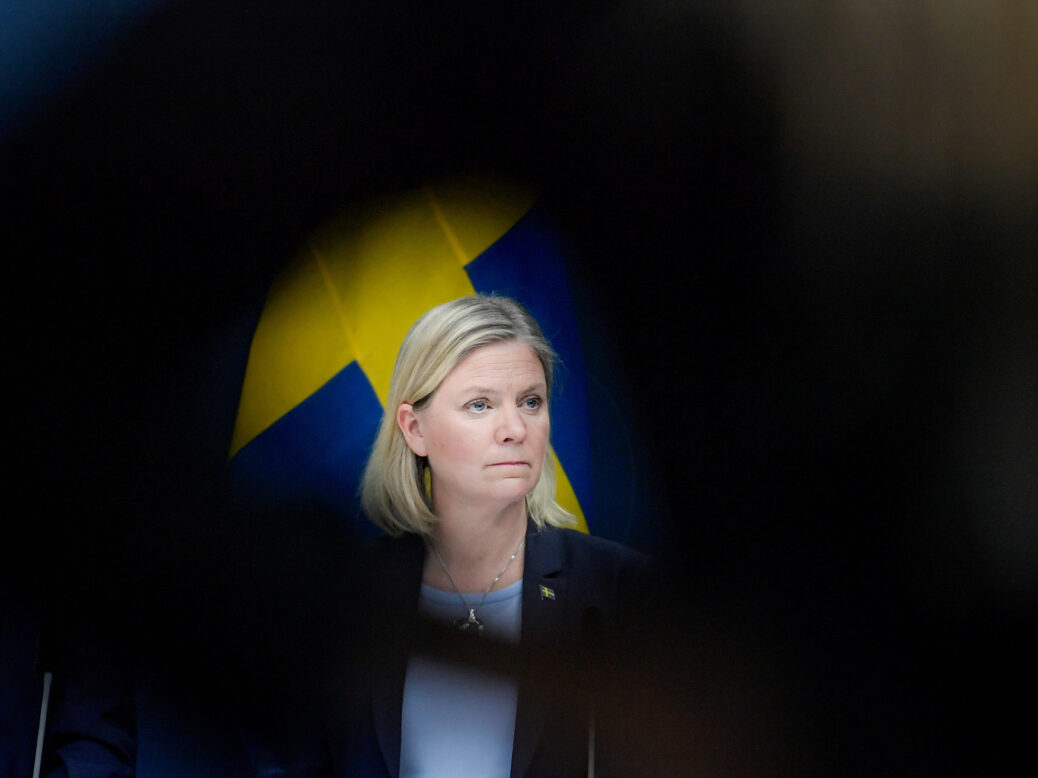
During the long and fraught process of forming a government in Sweden’s fragmented parliament this autumn, Magdalena Andersson chose her words carefully when addressing the country’s rampant gun violence. One carefully rehearsed phrase repeatedly tripped off her tongue: “We will turn over every stone to break segregation – and the violence that has eaten its way into the body of our society.”
For Andersson – who became the country’s first female prime minister on 30 November, after a false start the previous week – the aim is to send a message to voters that she is determined to put a stop to the gang violence afflicting Sweden’s cities. But it’s also to show that she accepts that shootings are connected to segregation between immigrant-dominated housing estates and the rest of the country.
Acknowledging that link – and implicitly, the link between the violence and decades of liberal Swedish immigration policy – was until recently taboo for Andersson’s Social Democrats. It remains a sensitive subject to a party that has long wanted Sweden to be seen as a “humanitarian superpower”. But the rise of the far-right Sweden Democrats, who have parked themselves at 20 per cent in the polls, combined with daily headlines of new acts of violence in suburbs with high immigrant populations, has forced the party to toughen its stance.
Some 47 people in Sweden lost their lives in shootings last year. This year looks unlikely to be any better: by 30 November, the death toll stood at 44. Shootings have become so commonplace that, individually, they pass without more than a perfunctory news report. But a gang killing on 21 October of this year received more attention than normal because award-winning rap artist Nils Grönberg, known by his stage name Einár, was shot dead at close range outside his flat in the middle-class Hammarby Sjöstad area of Stockholm.
On the face of it, Grönberg wasn’t typical of those associated with Stockholm’s gangland: he was born in Sweden to two Swedish parents, and his mother is an actor at Stockholm’s Royal Dramatic Theatre. But the headline facts of his background belie a more troubled adolescence: after skipping school from a young age he got in with a bad crowd. At 16 he released a breakout rap single, and he dedicated the accompanying video to a murdered gang leader from Enskededalen, the area of southern Stockholm where Grönberg grew up.
Einár’s murder came just a week before the appeal hearing of several men convicted of involvement of kidnapping him last May.
The Vårby Network, a gang that takes its name from the deprived immigrant-dominated housing estate in Stockholm’s suburbs in which it operates, kidnapped Grönberg in 2019, when he was 17. The abduction was orchestrated remotely by 33-year-old Vårby native and gang leader, Chihab Lamouri, from his home in Spain.
Among those involved was rapper Haval Khalili, whose role was to lure Grönberg into a trap so that the other gang members could kidnap him. According to prosecutors the motive was purely financial: the gang members assaulted him, took his Rolex watch and gold chains. Grönberg himself refused to cooperate with police investigating his kidnapping and did not witness at the trial of his abductors.
Grönberg’s murder encapsulates many of the fears the public has over gangland killings. That he was white and ethnically Swedish made him atypical of both victims and perpetrators, but researchers say Sweden’s criminal gangs are organised on geographical rather than ethnic lines. They spring up in areas with desperate social problems that usually have large immigrant-origin communities, but white kids who live there have never been automatically spared from the gangs’ clutches.
Sweden is the only country in Europe in which fatal shootings have increased over the past 20 years, according to a study released earlier this year by the Swedish National Council for Crime Prevention (Brå). It is now among the worst-hit countries on the continent, with four deadly shootings per million inhabitants last year – nearly three times the European average. Eighty per cent of gun crime is linked to organised crime, Brå says.
Bringing gang violence under control was already a hot political issue before the death of Einár. Polling firm Novus lists law and order as one of the biggest questions for voters, and by some margin the biggest question for centre-right voters – and the question is growing in importance.
Four opposition parties, including the Sweden Democrats, issued a 20-point plan for dealing with the issue, including stop-and-search zones, greater powers to spy on suspects’ communications and – in a move that possibly seeks to highlight the link between crime and immigration – more deportations of convicted criminals. Ten days later, the Social Democratic government published its own 34-point plan. Einár was killed the next day.
The high-profile nature of Einár’s murder – and the significant media attention that has followed his death – has added to the urgency among politicians to show they are willing and able to tackle the violence.
Andersson has only just stepped into the role of prime minister but her largest challenge is already apparent. With no sign of a let-up in the violence, and with voters increasingly frustrated by the failure of politicians to bring the gangs under control, Andersson, who faces the voters next September in a general election, will need to convince Swedes that she has a plan that will work.
[See also: Sweden named its first woman prime minister. Seven hours later she resigned.]





